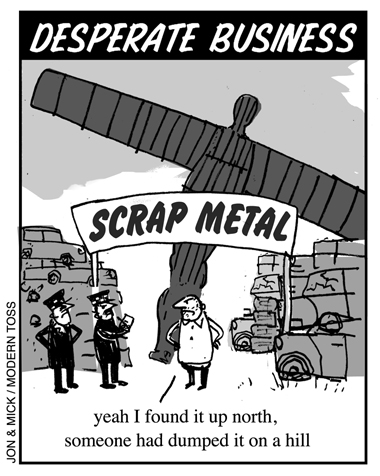
In 2013 the Scrap Metal Dealers Act was introduced. New analysis on metal theft raises questions on its success if any at all. In fact it may have encouraged a shift from petty crime to large scale organises crime.
In 2011/2012 copper prices were high and metal theft peaked. There was over 2000 reported cases per month. The Act was meant to cut this crime.
The act was introduced to stop cash payments for scrap. This idea was to force metal dealers to keep trackable paper trails. Initially this had the desired effect as there was a significant drop in metal thefts.
Over the last six months new research unfortunately has discovered that the theft figures are nearly back to where they were before the act. The analysis data discovered that prior to October 2013 Metal Act there were 400-500 report thefts per week. In the twelve months following the act it reduced to 200-300. However in February and March this year figures have leapt back to over 400 per week.
It was discussed at a recent conference why this may be happening:
- One way of getting around the law is by sending stolen metals to places where they still allow cash payments. For example; Germany, Scotland and Belgium.
- People who apply to become a licensed metal collector must not have criminal convictions related to metal theft – however you can have any other type of conviction and that does not matter. At the London conference, Hampshire police reported that 100% scrap metal yard owners had criminal convictions (just not related to metal theft)!
- Scrap metal dealers are declaring their 2 bedroom flat as a scrap metal site. This is because the cost of a site licence and a collector’s licence are quite similar.
- The act does not give the police enough powers to enforce the law. Police for example can’t search a suspect leaving a scrap dealer for cash.
Matt Ashby, a speaker at the conference, and researcher from University College London’s Department of Security and Crime Science, commented about the new report:
“Metal theft is a serious problem that we obviously need to deal with because stealing even a few pounds worth of metal can leave hundreds of houses without power or thousands of railway passengers stranded. The Scrap Metal Dealers Act and extensive work by the Metal Theft Taskforce seems to have helped reduce metal theft in the short term, but we don’t know what the long-term effect will be as some criminals adapt to get around the new rules. It is likely that the problem has been suppressed, rather than solved, and it could worsen if the police and their partners stop focusing on metal theft.” If you look at the figures it’s quite frightening how many police offices are actually on the beat at any one time. Definitely not enough to check out all types of crimes which is why criminals will take the chance of not getting caught.
Mr Owen, VPS, also added: “Ironically, the introduction of tougher laws may have had the unintended impact of shifting metal theft from petty criminals to organised crime. The implication is that whole containers of stolen metals are now being shipped abroad. But we can’t tell – ports are obviously the pinch points but police say ports only have the resources to check 0.5% of all containers.”
Unfortunately like many new policies, no thought is given to the impact the new legislation may produce. For example. Limiting what and how much can be taken to your local amenities site has resulted in a significant rise in fly tipping. Changes in European law about fridge recycling again has led to many being fly tipped.
So although trying to the best by the environment and also stopping criminal activities is obviously the way forward, more thought needs to be given on the longer term impact of these polices, as clearly some are making the situation worse than it was before. By making these policies, we need to give the police more powers and we also need to make sure they have enough resources to reinforce the laws.
There will always be a value in metals, especially precious ones. Metal theft will therefore always be temping for criminals either on a large scale or small scale basis. Theft can also have a huge financial impact on the companies targeted.
With the world’s resources getting less and harder to find on a daily basis, this problem will only get worse unless we act now.
| Call us today on 01279 215000 to find out how we can help you dispose of your IT equipment in a socially responsible way. |
